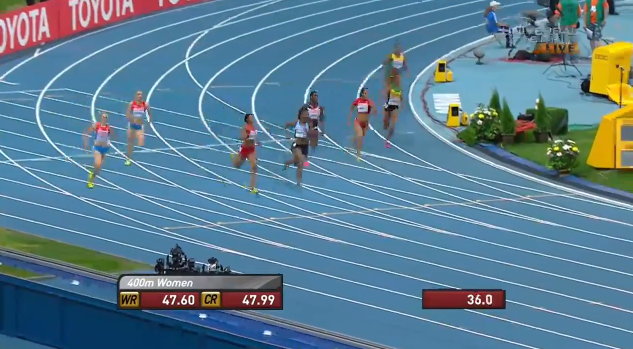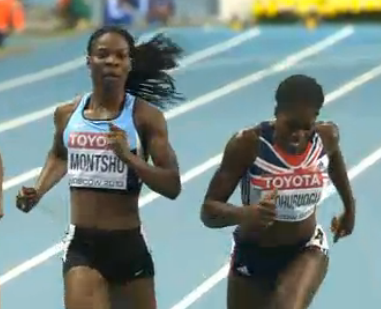IAAF World Championships Moscow 2013 - Interviews & RacesAug 12, 2013 by Mitch Kastoff
Four one-thousandths of a second, the difference between Ohuruogu and Montsho
Four one-thousandths of a second, the difference between Ohuruogu and Montsho

Four one-thousandths of a second. Just take a moment, literally, to appreciate the amount of faith, tactical prowess, and pure guts it takes to win a World Championship gold medal by that margin. Maybe all of those qualities are intertwined through training and confidence from competing on the world stage.
Maybe that’s why you can never doubt the patient Christine Ohuruogu.
In the most fantastic finish we’ve seen at these World Championships, the Briton was a quarter-miler possessed in the final few meters and overtook Botswana’s Amantle Montsho right at the line. The two favorites clocked 49.41 seconds, but after closer inspection, the race officials had announced that Ohuruogu had won by the slimmest of margins - 0.004.
The race was the tale of three very different strategies, in three consecutive lanes. Coming out of the blocks in lane three, USA’s Natasha Hastings showed no fear for the two pre-race favorites on her inside. The U.S. champion quickly made up the stagger on Ohuruogu, who was in lane four, and the American lead at the 200m mark.
Out in lane five, the world leading Montsho ran a fairly conservative first half. Perhaps her two defeats this year at the hands of Ohuruogu (in Birmingham) and USA’s Francena McCorory (in Lausanne) made her a bit more concerned to have something left in the final 100m.
If you look to those results even further, you'll notice a common ending. In Birmingham, Montsho lost by 0.01 (Ohuruogu won in 50.63). A few days later in Lausanne, the difference between McCorory's win (50.36) and Montsho's second place finish (50.37) was the same.
Still, the defending World Champion is no stranger to close finishes. Back when she won the 400m title in Daegu, Montsho held off a fast-charging Allyson Felix. Montsho would claim gold with a winning time of 49.56 to Felix's 49.59. The margin of victory was just 0.03-seconds.
The final in Moscow would be even closer. The result would be reversed, too.
Entering the top of the turn, Montsho's American rival was a few steps ahead. McCorory, who was out in lane six, had the lead at the top and middle of the turn, but Montsho could not wait any longer - she decided that the last 100m where she would make her move to win world championship gold.
With 70m left, Montsho was a few steps clear of the field. Her American challengers had started to move backwards. Then, with the powerful upright style that we’ve seen run down the most confident quarter-milers, Ohuruogu made her assault.

Montsho looked strong, but Ohuruogu was gaining with every step. Pumping her arms, raising her legs, the Briton knew that the two were going to be even very soon. The only issue was that Ohuruogu wasn’t there quite yet and there was only two meters before the line.
Ohuruogu dipped, Montsho stood tall. The two stared at the scoreboard until the crowd erupted. You couldn’t tell who had won because the two shared the same reaction - complete dismay. Ohuruogu was stunned, Montsho was shattered.
 "I can't believe I've done that, it feels like a dream, Ohuruogu told BBC. “It is what I have been working towards all season.”
"I can't believe I've done that, it feels like a dream, Ohuruogu told BBC. “It is what I have been working towards all season.”Ohuruogu now stands in the Pantheon of British Athletics. Her trophy case already boasts an Olympic gold (2008) and silver (2012), one World Championships gold (2007), two bronze medals in the 4x400m relay (2005 and 2007), plus a few more individual and relay golds from the Commonwealth Games, World Indoor Championships, and European Indoor Championships.
This race was simply vintage Ohuruogu. Back in 2008, the '07 World Champion became the Olympic Champion with a powerful last homestretch. Then last year in London, she had the same kick, but fell short to USA's Sanya Richards-Ross.
It took a very special effort to win this particular gold medal in Moscow. Ohuruogu broke Kathy Cooke’s 29-year-old British 400m record of 49.43, which was set at the 1984 Olympic Games.
Cooke’s mark was good for bronze, Ohuruogu’s was gold.